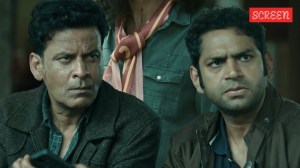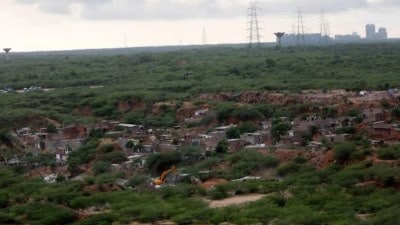Stay updated with the latest - Click here to follow us on Instagram
Need for sustained Centre-separatists dialogue: Omar Abdullah
J&K govt had only a limited role of a facilitator to resolve the long-pending issue,says Abdullah.
Asserting he would continue to bat for gradual revocation of AFSPA from Jammu and Kashmir,Chief Minister Omar Abdullah on Wednesday said reluctance on the part of separatists to engage in dialogue with the Centre was a stumbling block in finding a roadmap for resolving the Kashmir problem.
“The Constitution of India provides framework for a dialogue with the separatists as their role in resolution of the issue (Kashmir) is important. They are on different page in contrast to mainstream parties whose views are candidly clear on the subject.
“But,the reluctance on part of the separatists to get engaged in dialogue is proving to be a stumbling block in finding a roadmap to the problem,” Omar said interacting with a delegation of the European Union here.
He said his government was vehemently convincing the Centre to enter into a dialogue with the separatists and also engage Pakistan separately so that the long-pending political issues of Jammu and Kashmir were settled once for all.
Omar said he did not see any immediate headway in Indo-Pak or Centre-separatists dialogues for the fact that Parliamentary elections were on the cards. However,he underscored the need for a positive and flexible approach by India,Pakistan and separatists to come on the same page to get the political issues of Jammu and Kashmir resolved politically.
“There is a need for sustained internal and external dialogue between the Centre and the separatists and the two neighbouring countries of India and Pakistan to resolve the K-issue once for all,” Omar said. On AFSPA,he said he would continue to bat for its gradual revocation from the state.
The political issues of Kashmir were not born with the militancy in 1990 but their genesis was long back associated with the partition of the country when the future of all the states was decided other than Jammu and Kashmir,Omar said.
Referring to the special status of the state recognised by the Constitution of India,he said the accession of Jammu and Kashmir to Union of India was on four matters of currency,communication,foreign affairs and defence.
“While all the states acceded to Union of India and then merged with it,Jammu and Kashmir only acceded and not merged. That is why we have a special status,our own state flag and Constitution,” Omar told the EU delegation led by Ambassador Joao Cravinho. “There are diverse views regarding the Kashmir issue. While one extremist view is for secession,the other extremist opinion is total merger of the state with the Union of India.
“Unless the process of dialogue is started with a view to finding out flexibility in both the views and carve out a roadmap for addressing the issues,the position will not
change,” he said.
Omar referred to the constitution of various teams of Interlocutors and Track-II Diplomacy to ascertain the public perception in general and the opinion of various shades of political beliefs to resolve the complex K-issue.
Expressing dismay that these initiatives were not taken to their logical conclusion,the Chief Minister said the latest team of Interlocutors formulated a comprehensive report after meeting some 6,000 opinion groups in all parts of the state but no headway in this and other reports,including that of Justice Sageer Working Group on State-Centre ties,”makes the people apprehensive”.
He said “this makes them subscribe to the idea that the Union government engages people of the state when there is trouble in the state and sleeps over the situation when it is more or less conducive.”
Omar said the Union government had implemented various recommendations of the Working Groups on economic development,employment generation and welfare measures while it had sent back Justice Sageer report to the state for recommendations.
“I have constituted a Cabinet Sub-Committee in this regard and my government is a coalition government of National Conference and Congress parties. They have different opinions on Centre-State relations. “So,the matter is time-consuming and complex to be resolved with a twinkling of eye,” the Chief Minister said.
The Jammu and Kashmir government had only a limited role of a facilitator to resolve the long-pending issue,he said. In reply to a question relating to reduction of armed forces following improvement in the situation,Omar said the presence of Armed forces was directly related to the graph of violence.
“When the degree of violence and militancy reduces there should be normal reduction in the footprints of Army.
However,this has not been the case here so far,” he said maintaining reduction in para-military forces had taken place but not of Army due to various reasons put forth by the Army top brass.
“Same is the case with revocation of AFSPA from some areas in a phased manner advocated by me repeatedly. While I am confident there is need for its partial revocation,the Army has a different view on the subject,” Omar said. The Chief Minister said he held his view firmly and would continue to bat for revocation of AFSPA from the state gradually.







